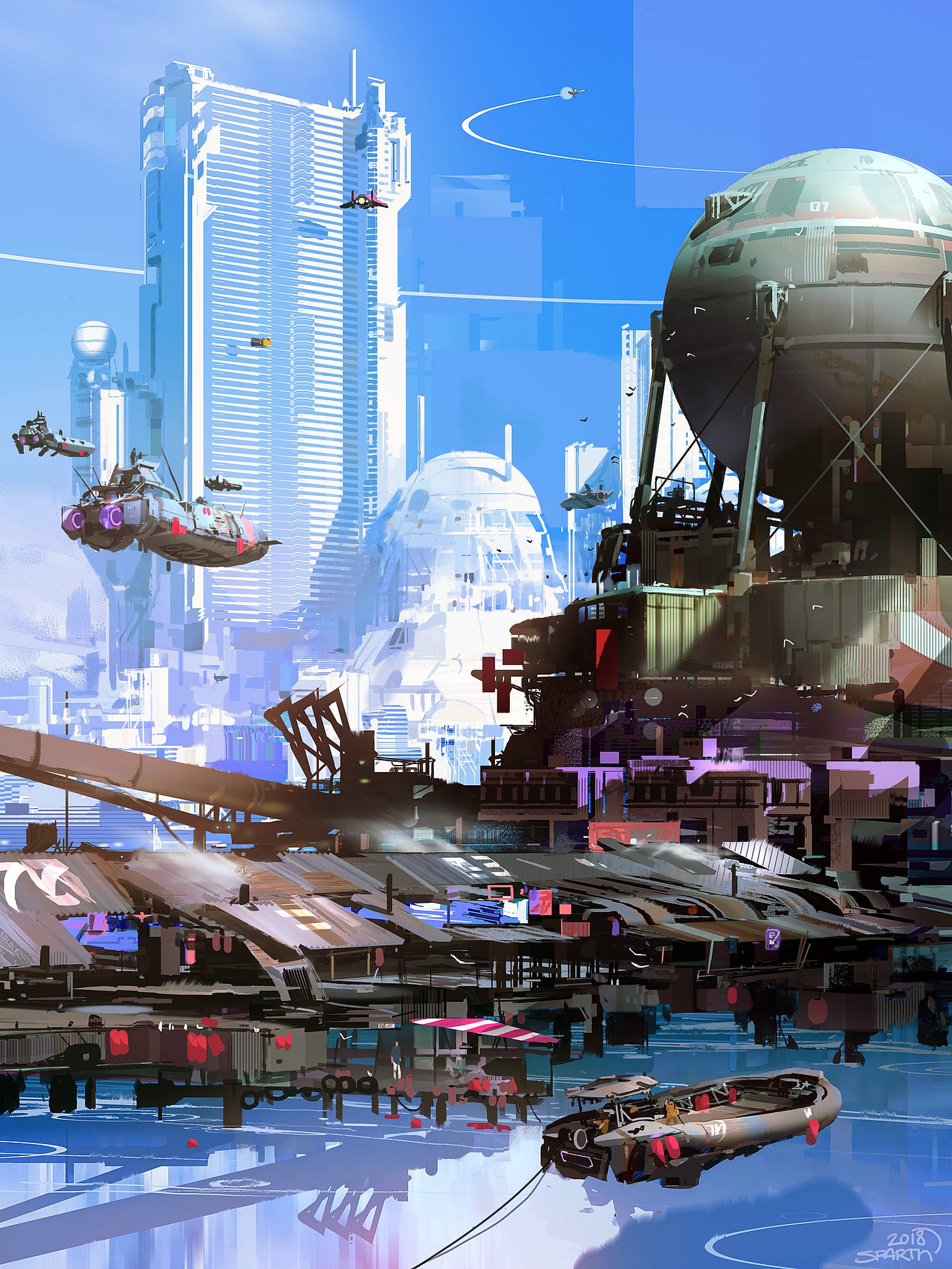quick note: i've been using archive.today (archive.ph, archive.is) to share paywalled links, but the sites’ve been having frequent issues. i suppose i'll start including the original links, just to have a proper record. hope they can survive. they've fought with Cloudflare, & surely have made many enemies. if i were more conspiracy-theory minded, i’d think it likely that they're the target of cyberattack operations. i'm still unaware of another high-quality free site for easily sharing saved website copies
1. really great Alice Maz post on AI-powered extended cognition tools, & historic predictions about advanced technology from Vannevar Bush & Joseph Licklider
2. True Anomaly, newly-unstealthed space warfare startup. great name imo
3. Dawn Aerospace did some test flights (rocket space planes). will be a long road to commercialization. also from Ars, see this piece on Venus, pursuing hypersonic commercial air travel with a small jet. but again, very early stage, probably will fail
4. Agility Robotics, newest company pursuing humanoid robots. initially for warehouses. this is going to happen, & it'll be spectacular. total factor productivity number go up
5. new speed hack found in Mario Kart 64. the accompanying video is good. god bless the speedrunners, a model of tenacity, creativity & intellectual rigor (unironically)
6. good Heatmap piece on Tokyo's impressively car-free urbanism. many of the causes are highly contingent & path-dependent. but there are some policy lessons that could be adopted by other countries (original)
7. review of direct lithium extraction startup landscape. (original). see also this FT piece on lithium mining in Africa, & China’s dominance there (original)
8. Austin Vernon on radioisotope power systems. yes
9. fun Bloomberg cover story about beating roulette. was disappointed that the methods weren’t as “mathematical” compared to e.g the MIT blackjack team or the lottery statistician ppl. but cool nonetheless (original)
10. excellent Palladium piece on global fertility collapse. i agree that the most plausible medium-term solution is cultural (an endogenous pro-natalist societal response). & i'm actually more optimistic than the authors about this happening, at least in certain places. there are also technological solutions that can & probably will emerge, like more advanced fertility tech & eventually artificial wombs. population decline is a big problem that will cause all kinds of issues, but i’m also not a complete doomer here
11. also from Palladium, a fun piece about the golden age of US aerospace post-WW2. reading about the SR-71 is always special for me, since one of my grandfathers was a military engineer who worked on the plane (don't doxx me bro)
12. Planned Obsolescence, new blog about AI from Ajeya Cotra of OpenPhil & Kelsey Piper of Vox. should be good
13. asteroid mining, still alive somehow. i expect Starship’s upcoming test flight to either scrub or fail. but if it can eventually be made to work with the promised economics, space mining firms that persist should have a new lease on life
14. speaking of asteroids, the White House released a new planetary defense strategy. also NASA posted about DAGGER, a solar storm early-warning modelling system. & Power Magazine did a recent podcast episode about EMP & solar storm defense
15. Economist opinion post on pro-growth environmentalism (original). this introduces a longer report on electricity grid infrastructure, which is very good. worth reading in its entirety, but the piece on grid-forming inverters was the best (original)
16. good FT article on US life expectancy (original)
17. Angie Schmitt on road safety, automated traffic enforcement (original)
18. Amazon has apparently opened up its Sidewalk mesh network to private developers. it’s a low-bandwidth, low-energy, long-distance IoT system mainly used to support Ring cameras. seems really cool. IoT has passed its initial hype-cycle peak, but is still moving forward. as things like satellite internet & ambient solar collection surfaces arrive, the future will clearly have tons of tiny networked sensors & devices doing a cornucopia of useful tasks. i can't remember if Helium still exists but certainly this would present a big threat
19. Tanner Greer summarizes a bunch of posts he's been doing about bureaucracy, management & culture. great stuff
20. re-read this 2019 Slate Star Codex post on GPT-2 as a step towards AGI, it does hold up
21. Quanta piece on an intriguing frontier in mathematical particle physics, aiming to get more precise results (Écalle's 'resurgence theory')
22. Ted Nordhaus & Adam Stein of Breakthrough, on US nuclear regulation, Oklo etc. (original). see also Breakthrough’s writeup on the ADVANCE Act, a proposed federal nuclear reform bill that has bipartisan support
23. widely shared, but an interesting theory about US military recruiting difficulties: new medical records software has curtailed the previously-widespread informal practice of fudging certain requirements. great example of the "Seeing Like a State" bureaucratic drive towards legibility being a double-edged sword
24. Parallel Systems, pursuing autonomous battery-electric rail cars. more detail here. really like this idea. i posted previously about air & noise pollution from urban railyards, & how it's an increasing problem bc often new housing is concentrated in these kinds of industrial areas, bc that's the only place it's allowed due to regulation. so electrifying railyards is worthwhile in multiple ways, despite part of me thinking the whole category is anachronistic. autonomous trucks + drone delivery is the eventual way to go. but trains still have a role to play
25. Tim Lee on copyright & AI. copyright delenda est
26. twitter thread of proposed mega bridges & tunnels that don’t exist. build them all
27. interesting argument about private AI training data as a competitive advantage
28. NYTimes piece on sodium batteries, yet another area where China seems to be dominating. but there’s more of an opportunity here for US & others to compete, compared to lithium where everyone’s playing catch-up. i’m optimistic about sodium for stationary grid storage. some ppl think it's the final form of EV battery chemistry. less convinced of that, but the new hybrid sodium/lithium EV batteries are intriguing (original)
29. company pursuing small hydro in irrigation canals. neat
30. NASA is about to start a one-year Mars base simulation, with four participants. i’m a huge supporter of this research agenda in a broad sense, as it is necessary for long term sustainable space settlement. but building a closed biosphere is the bigger challenge. this experiment is more about crew health & psychology, although they will be growing some food
31. decent Adam Toooooze FP post on Europe's energy transition (original). see also this long essay from Jason Bordoff & Meghan O’Sullivan, about energy geopolitics (original)
32. Economist on new military camouflage tech for electronic surveillance (original)
33. & also the Economist with a briefing on USA’s continued economic strength. i saw Noah Smith comment that increased/sustained US economic dominance isn't necessarily a good sign wrt to competition with China or unfriendly countries, if it comes at the expense of friends & allies. worth considering, but it’s too simplistic to view the piece as saying USA has merely a bigger sub-slice of a smaller slice of the economic pie, relative to China (original)
34. Niskanen report on manufactured homes. this issue will only get more important as progress continues in advanced construction tech in higher-end markets, e.g 3d printing (Icon) & highly modular building (Cover, Modal). also worth sharing the OG post on this general topic, Nolan Grey's “redneck urbanism”
35. very nice Seattle Times update on Boeing (original). & behold this incredible construction fuckup at Sea-Tac airport. apparently a brand-new terminal won't be able to fit as many simultaneous widebody aircraft as was intended. oops. also please note the byline (original)
36. enjoyable review of Rivian’s EV truck for "offroad" "backcountry" camping. i place these words in quotes since i am a wilderness camping pedant & don’t consider driving a car on big dirt trails either off road or backcountry. but it's not important (original)
37. interesting article about Alexandre Kojève, from a conservative European Catholic perspective. i don't agree with some of the claims near the end, but still quite good
38. once again i am mostly not sharing AI links despite the insane amount of incredible stuff coming out each week, bc there are so many others who are massively more attuned to it than i. nevertheless, i here are some fun generative image prompt threads: dyson spheres. orthodox church space program. civil war photographs of moloch. futuristic architecture. women laughing while eating salad. warhammer 40k pope
39. Biofire, pursuing fingerprint- & facial recognition-locked smartguns. ppl have been trying this for years, never succeed. for guns' primary use case, you really need reliability & functionality at a moment's notice. complex electronics can thus be risky. i’d hope that eventually we can get smartguns that are sufficiently rugged & simple. the benefits are obvious. but i'm not holding my breath. the video also mentions political economy challenges, namely pro-gun ppl being wary of smartguns bc they fear that if successful, there'd be a govt rush to ban or heavily restrict non-smart guns. it’s a reasonable concern. but ultimately too speculative to outweigh my default view that preemptively regulating new technologies is bad (outside of certain extreme cases like those involving x-risk). we can address the costs & downsides of new technology as they emerge. a permissionless innovation paradigm is overall much better & gives us a more dynamic society
books
Justice for Animals: Our Collective Responsibility by Martha Nussbaum. this links post is already quite long so i’ll be very brief, despite having tons of thoughts. basically Nussbaum applies her version of capability theory to animals. i’ve posted my views on animal welfare previously… in short i disagree with nearly everything in the book. i also favor Amartya Sen’s capability theory over Nussbaum’s objective list approach. but still an interesting read. see also this review from Ozy Brennan
The Fall of Hyperion by Dan Simmons. sequel to Hyperion, which i read in 2021 & really enjoyed. this novel picks up the story immediately, & it took me a while to remember what was going on. this hurt my experience of the book, i think. it was still good, but much more of a generic space opera, focusing on a huge war between empires & dropping Hyperion’s narrative frame involving a group of travellers telling each other stories. probably won’t read the later novels unless someone convinces me otherwise





